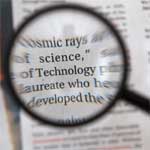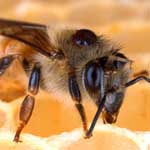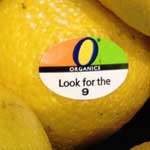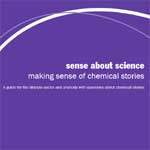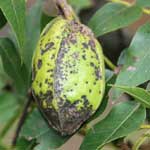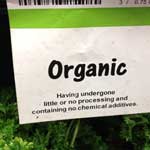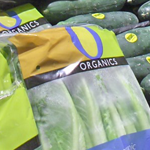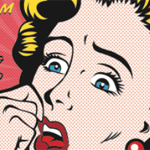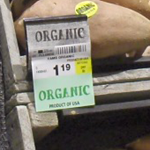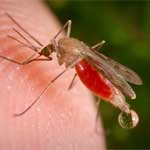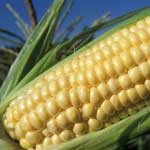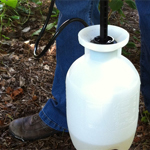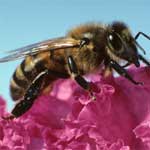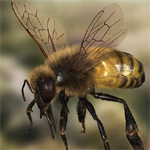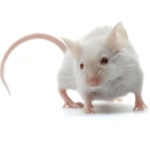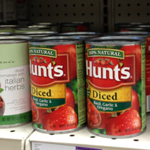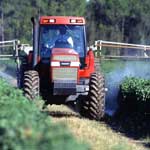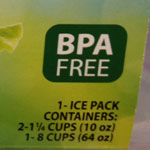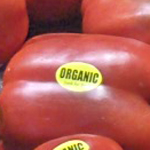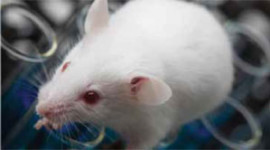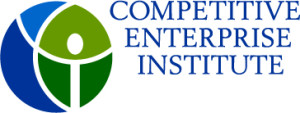"Espousing Phony Science? You Better Hope Hank Campbell Doesn’t Find Out," By American Council on Science and Health. ACSH friend (and the creator of the enormously popular Science 2.0 website) has the uncanny ability to sniff out bad (and hypocritical) science, and when he does, he is not shy about speaking his mind. This time he goes after the radical environmental group Friends of the Earth, and by the time they read his piece they will not be “Friends of Hank.” His message is about the … [Read more...]
Tackling Anti-Chemical, Unscientific Nonsense
"Manmade or Natural, Tasty or Toxic, They're All Chemicals …" by Mark Lorch. Chemicals are bad, right? Otherwise why would so many purveyors of all things healthy proudly proclaim their products to be "chemical-free" and why would phrases such as "it's chock full of chemicals" be so commonly used to imply something is unnatural and therefore inherently dangerous? On one level these phrases are meaningless – after all, chemicals are everywhere, in everything. From the air that we breathe to the … [Read more...]
Improving Honeybee Health
"Nationwide Survey Shows Dramatic Improvement in Honeybee Health," by Todd Myers. During the last week, there has been a great deal of attention to a study claiming pesticides are responsible for an increase in honeybee hive death. Known as Colony Collapse Disorder (CCD), beekeepers and scientists have been working to find out what is to blame for the trend. What has been ignored, however, is recent good news about CCD. A recent study by Bee Informed, a nationwide survey of beekeepers, the … [Read more...]
Too Strictly Organic?
"To “Be” or “Not to Be” Organic?" by Dan Janzen. The virtues of many aspects of the Organic Movement such as heightened concern for healthy eating, and increased sensitivity or aversion to exposure to toxins in the environment can be touted as very positive. However, to fully explore the impact of all aspects of the Organic Movement there are some important questions to consider. (1)Is it possible to cross the line in Organic Movement initiatives and “throw out the baby with the bathwater”, … [Read more...]
Making Sense of Chemical Stories
"Making Sense of Chemical Stories," by Sense About Science. The new edition of our public guide, Making Sense of Chemical Stories, was published by Sense About Science today with support from Royal Society of Chemistry. People are still being misled by chemical myths. This needs to stop. We urge everyone to stop repeating misconceptions about chemicals. The presence of a chemical isn’t a reason for alarm. The effect of a chemical depends on the dose. In lifestyle commentary, chemicals are … [Read more...]
Toll of Organic Farming
"The Hidden Cost of Organic Farming," By Dan Janzen. I was prompted to begin blogging upon my return from three and a half months of agricultural development work among the Nasa and Guambiano Native Americans in Cauca Department of Colombia. People were giving them books to read promoting 100% organic methods with all kinds of information which, in my opinion, was grossly misrepresenting the facts. Many different organizations including ones from the government were promoting 100% organic … [Read more...]
Unsustainable Organic Farming
"Organic Farming Is Not Sustainable," Henry I. Miller. You may have noticed that the organic section of your local supermarket is growing. Advocates tout organic-food production—in everything from milk and coffee to meat and vegetables—as a "sustainable" way to feed the planet's expanding population. The Worldwatch Institute, a Washington, D.C.-based environmental group, goes so far as to say organic farming "has the potential to contribute to sustainable food security by improving nutrition … [Read more...]
Misleading Organic Marketing
"Organic Marketing: Not Truthful, Often Misleading," By John R. Block. As someone who has dedicated his career to agriculture, I’ve often wondered what drives the now double-digit growth in the $35 billion U.S. organic products industry. Why are so many people willing to pay premiums up to 100 percent or more for items that carry an organic label, and do they really understand what that label means and — even more important — what it doesn’t mean? Many of these questions have now been answered … [Read more...]
“Pesticide-Free” Claim Debunked
"Organic ‘Pesticide-Free,’ and Other Claims Debunked," by American Council on Science and Health. Now that the claim that organic foods are more nutritious than conventionally-produced ones is rarely espoused by responsible writers, organic producers and adherents have fallen back on the “fewer pesticides” claim. But is that really accurate? Blogger Steven Savage says no, not really. In his essay on why organic farming is less than optimal from an environmental point of view, Mr. Savage points … [Read more...]
Fearmongering on Chemicals and Male Fertility
"Can Chemicals Slow Sperm — Need We Worry?" By American Council on Science and Health. spermA recent study published in EMBO Reports provides the latest fuel for fear-mongering about chemicals. Dr. Christian Schiffer of the Center of Advanced European Studies and Research in Bonn, Germany and colleagues tested 96 different chemicals found in many household products, foods, and personal care products to see what effect they might have on human sperm. The impetus for this research was the theory … [Read more...]
Interview with Julie Gunlock
"New: Author Interview with Julie Gunlock," by Alyssa Condrey Julie Gunlock is director of the Culture of Alarmism project at the Independent Women’s Forum (IWF) and author of a recent book, From Cupcakes to Chemicals. Ms. Gunlock was gracious enough to answer a few questions for NeW about her new book, discuss the conservative movement, and offer up advice for conservative women. Read her interview below! What initially prompted you to research and write about the culture of alarmism? Read … [Read more...]
Organic and “Pesticide Free” Not the Same
"Spending More For Organic Does Not Buy You Pesticide-Free," By Steve Savage. There are several different reasons people are willing to pay more for organic produce, but many consumers do so believing that it is a way avoid pesticide residues. That widely held belief is unfounded. Here is why: There are definitely pesticides used in the growing of organic crops. There are residues of those materials on the harvested products. Residues of synthetic pesticides are also frequently found on … [Read more...]
Endocrine Disrupters in Your Backyard?
"The Newest 'Endocrine-Disruptor' Can Be Found in Your Backyard, Claims a NY Times Op-ed," by American Council on Science and Health. It’s starting to feel a little bit like summer on the East coast now, which means people are clean up their yards and gardens. And that means using “chemicals”, which according to an op-ed by physician Diane Lewismay in the NY Times, can end up in drinking water. Is that true? And if so, are these chemicals (generally pesticides and weed-killing herbicides) … [Read more...]
DDT and Malaria
"DDT Research is “Biased and Erroneous” If You’re Gonna Screw Up, You Might As Well Do It Really Well," by American Council on Science and Health. Screen Shot 2014-05-09 at 1.58.22 PMIf there is a more obvious case of bad science, and its impact on human health, we’d like to see it. Because it turns out that DDT, the evil chemical blamed by Rachel Carson in her 1962 book Silent Spring for thinning of bird eggs, does no such thing. And the consequences of this “error” are tragic—one million … [Read more...]
Feeding the World with the Help of Herbicides
“'Atrazine and The Forever War on Science' Makes for Scary yet Incisive Reading," by American Council on Science and Health. In a brilliantly-written perspective piece on his Science 2.0 blog, Hank Campbell skewers a lot of folks who really need skewering. His scythe and rapier draw blood from his targets, and his insights accrue to the reader: the rampant chemophobia pervasive in America, where “chemicals” are feared when they are recognized at all; the pandering of pseudo-journalists giving a … [Read more...]
Anti-Pesticide Attack on Science
"Atrazine And The Forever War On Science," By Hank Campbell. I'll tell you up front, I am not a big fan of chemicals. It's not that I have chemophobia, or any science-phobia, I instead have that special sort of elitism that is available to people who have just been lucky enough to not need chemicals. I don't even like to take aspirin and I have that luxury because I haven't needed to take any drugs for a recurring condition, so it's really easy for me to embrace such naturalistic posturing. … [Read more...]
Rash Regulation May Harm Honeybee
"Regulate-First-Think-Later Approach to Harm Honeybees," by Angela Logomasini. European bureaucrats placed a two-year ban on a class of pesticides in the name of “protecting honeybees” when in fact, as one EU official recently admitted, they didn’t have evidence that the chemicals present a serious threat to honeybee health. According to an article in Food Chemical News, the European Commission official admitted that the government banned the chemicals simply because it was “the only factor” … [Read more...]
Growers Call for Science-based Approaches to Help Honeybee
"Growers say Pesticide Ban Won’t Solve Bee Problems," Eric Mortenson. The Oregon Association of Nurseries urges Congress to use a collaborative and scientific approach to regulating pesticides that some blame for honeybee deaths. Instead of banning the neonicotinoid class of pesticides, Congress should follow Oregon’s example and use a collaborative and science-based approach to improving honeybee health, the executive director of the Oregon Association of Nurseries said. OAN director Jeff … [Read more...]
Rodent Tests Don’t Justify Proposition 65 Listing
"DINP’s Placement on Prop 65 List is not Warranted," By American Council on Science and Health. Diisononyl Phthalate (DINP) was added to California’s ever-growing Proposition 65 list of “known carcinogens” late last year. However, Elissa Sterry, VP for ExxonMobil’s Intermediates Global Business, told the Consumer Products Safety Commission that the rodent studies upon which this decision was based were essentially meaningless. She says, “the relevant mechanisms of cancer development are not the … [Read more...]
Butterworth On Target Regarding BPA Research
"Trevor Butterworth and (butter)worthless claims about BPA," By American Council on Science and Health. The always dead-on Trevor Butterworth once again hit the bullseye in his op-ed in Forbes.com. And in his unique way, he makes the perennial critics of BPA—a component of the plastic that seals canned foods—look rather foolish. ACSH’s Dr. Josh Bloom is in complete agreement: “After reading this piece, it would seem rather obvious that the dozens of studies and papers on the ‘health effects’ … [Read more...]
BPA-Levels in Food Cans
"Canadian Government Study: Death From Overeating Before Any Risk From BPA," By Trevor Butterworth, STATS.org. The Canadian government, which helped to trigger worldwide fears about the effects of trace amounts of BPA in food by using the precautionary principle to guide risk management, continues to produce studies showing that precautionary thinking is wildly off the mark on BPA. The latest study on BPA sampled 403 domestic and imported cans containing fruit, vegetables, juices, other … [Read more...]
Questionable Study on Children and Pesticides
"For the Record: 'Children in agricultural areas are being exposed to a dangerous cocktail of pesticides,'" By Sense About Science. An article in the Guardian, 29th April 2014 reported that “Children in agricultural areas are being exposed to a dangerous cocktail of pesticides”. It referred to a report published by Générations Futures, a French health and environment group. Dr Paul Illing, a recently retired registered toxicologist and regulatory affairs consultant explains this is not what the … [Read more...]
Moms Need Not Fear BPA
"Despite Scare Stories, Fears about BPA are Unnecessary," By Cherylyn Harley LeBon. As soon as someone mentions BPA (bisphenol A), I recall the glasses and glass containers our family now uses to replace the plastic containers that previously populated our cupboards. Like many moms, my top priority is keeping my kids safe, so I was concerned about BPA in the past. When the media began reporting BPA might be toxic, we replaced the plastic products and other things in our home thought to contain … [Read more...]
World Malaria Day
"World Malaria Day: April 25, 2014," by American Council on Science and Health. Today marks the 8th annual official recognition, via World Malaria Day, of the horrendous toll taken by the mosquito-born infection. ... Read more. Watch the Video: … [Read more...]
Organic Mommy Mob
"The Beliefs of the ‘Organic Mommy Mafia’ Are on Trial," by American Council on Science and Health. “‘Am I going to be an outcast?’ A friend, who recently moved to an upscale neighborhood in Madison, Wis., called me last week to ask if she would be able to make mommy friends if she continued feeding her children — gasp! — non-organic food.” This is how Naomi Schaefer Riley begins her piece in the New York Post, in which she very accurately describes the emergence of a group of parents called … [Read more...]

